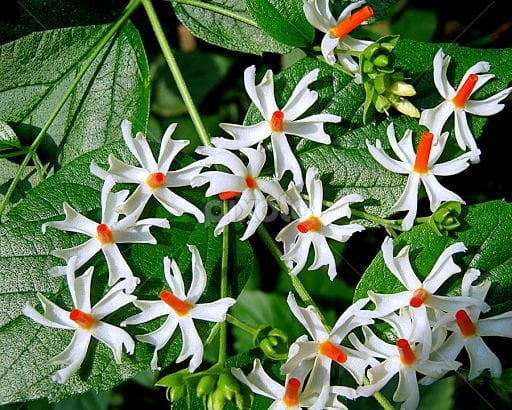
Harsinghar, also known as Parijat or Night Jasmine, is a powerful medicinal plant with numerous health benefits. It is widely used to treat conditions such as acute gout, dengue, chikungunya, malaria, and arthritis. Additionally, it helps prevent gastrointestinal ailments, indigestion, stomach ulcers, and respiratory issues. Thanks to its anti-bacterial, anti-viral, and anti-fungal properties, Harsinghar fights off infections and serves as a natural laxative.
Overview of Harsinghar
Harsinghar, native to Southeast and South Asia, is a small tree or shrub that can grow up to 33 feet tall. Its bark is grey and flaky, while its broad leaves have a distinct margin. The plant’s beautiful flowers have 5 to 8 white petals with an orange-red center. These flowers are most vibrant at night and tend to lose their brightness during the day. The tree bears fruit in the form of a round, brown, heart-shaped capsule about 2 cm in diameter, containing a single seed. Harsinghar thrives in places like West Bengal, India, and Kanchanaburi Province in Thailand and is also used as a yellow dye for clothing.
How to Use Harsinghar

A traditional way to harness the benefits of Harsinghar is to boil a handful of its flowers and leaves in 1 liter of water. Allow the mixture to boil until the water reduces by half. Sip 10 ml of this infusion, diluted with lukewarm water, in the morning on an empty stomach and before bed. Results can be noticed within a week.
Nutritional Composition
Harsinghar’s leaves are rich in benzoic acid, fructose, glucose, carotene, amorphous resin, ascorbic acid, methyl salicylate, tannic acid, oleanolic acid, and flavanol glycosides. Its flowers contain essential oils and glycosides, while the seeds are packed with palmitic, oleic, and myristic acids. The bark provides alkaloids and glycosides. These components give the plant its antifungal, antiviral, hepatoprotective, and immunostimulant properties.
Health Benefits of Harsinghar
1.Relieves Chikungunya and Dengue Symptoms
Harsinghar has proven effective in helping patients with dengue and chikungunya by boosting platelet count. When used consistently as a decoction, it can improve symptoms within three days. However, continuous use is recommended for lasting relief.
2.Treats Arthritis
The anti-inflammatory properties of Harsinghar make it effective in treating arthritis. By boiling its powdered leaves and consuming the extract, people can find relief from joint pain and inflammation. Long-term use often leads to a noticeable improvement in symptoms.
3.Cures Malaria and Fever
The leaves of Harsinghar are highly effective in treating fever, including those caused by chronic malaria, as well as symptoms like nausea and diarrhea resulting from mosquito bites.
4. Prevents Radical Damage
Harsinghar is a potent antioxidant that helps fight oxidative damage, a primary cause of aging and many health problems. Regular use can also help prevent cancer and slow the signs of aging.
5. Antiviral, Antibacterial, and Antifungal Properties
Harsinghar oil can combat infections caused by bacteria like *E.coli* and *Staphylococcus*, and fungal infections. It also helps with viral conditions such as encephalomyocarditis and cardiovirus.
6.Treats Cough and Breathing Issues
Persistent coughing, whether from lung problems or infections, can be reduced by consuming Harsinghar regularly. It also provides relief from asthma symptoms, improving breathing without completely curing the condition.
7. Laxative and Digestive Aid
Harsinghar is a natural laxative, helping to relieve constipation and regulate digestion. It also prevents gas and other stomach-related issues.
Other Uses of Harsinghar
Harsinghar is also used to treat various conditions such as dandruff, lice, vertigo, scurvy, anxiety, high blood pressure, and menstrual cramps. It is even used as an antidote to snake bites in some cases. This versatile herb is known to provide relief from panic attacks and alleviate symptoms of piles.
Potential Side Effects and Allergies
While Harsinghar has numerous benefits, excessive consumption can lead to negative effects. Its bitter taste may cause nausea in some people. Overuse, especially for cough treatments, can cause throat irritation. It is advised to consult an Ayurvedic doctor before using Harsinghar for specific health concerns.
Cultivation of Harsinghar
Harsinghar thrives in tropical climates and requires plenty of sunlight. It grows best in sandy, well-drained soil and cannot survive in frosty or highly saline conditions. It is commonly found in various parts of South and Southeast Asia.






